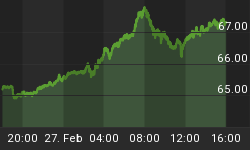In an article this week that examined the troubles brewing in Citigroup's mortgage business, the Wall Street Journal focused on Natalie Brandon, a 51 year old married woman from Granada Hills, CA, who is currently unable to make the payments on her $625,000 adjustable rate home loan from Citigroup, despite the fact that the rate will not even reset higher until June of next year. Amazingly, the Journal reported that Mrs. Brandon bought the house in 1985 for just $105,000, but had chosen to refinance five times over the past seven years, borrowing more than $500,000 and spending every single penny. While this may be an extreme example of American profligacy, it is by no means unique. Unfortunately this type of behavior typifies everything that is wrong with the modern American economy.
Had this homeowner behaved responsibly, as was typical for Americans of prior generations, her current monthly mortgage payments would likely be less than $600 and the remaining balance on her loan would be about $40,000. In eight more years she would have owned her home free and clear, and would likely be on track for early retirement. Instead, after 22 years of making mortgage payments, she is now $625,000 in debt. The article stated that she had recently tried to refinance into a 6%, forty year, fixed-rate mortgage, but it fell through. Even if she had qualified, she would have been obligated to make monthly mortgage payments of close to $4,000 until she was in her nineties.
For years, Wall Street and the media have been singing the praises of the heroic American consumer. To that end Mrs. Brandon could be portrayed as Wonder Woman. She did her part to power our consumer driven economy by borrowing and spending to her heart's content. Her last refinance even allowed her to buy a brand new Lexus. As long as she could find a greater fool willing to loan her more money, there was no limit to what she could buy. As it turned out, Citigroup was the greatest fool, left holding the bag on a $625,000 mortgage on a house now likely worth only half that amount.
Is it any wonder that we have enjoyed such a vibrant consumer based economy when a working class couple with perhaps $60,000 per year of household income can borrow over $500,000 (tax free) and buy whatever they want with the money? As the bills come due and those who have been doing all of the lending finally realize they will never be repaid, this crazy consumption binge will finally come to an end.
As the losses mount, the credit crunch will spread from mortgages to auto loans and to all forms of consumer lending. The days of Americans borrowing to consume are finally coming to a long over due end. Although it seems like science fiction to Americans raised on credit cards, within a few years most will only be able to buy those goods they can afford to pay for with cash.
In the long run of course, this will be a very positive development. Borrowing to consume is a waste of savings and undermines legitimate economic growth. Money loaned to consumers is unavailable to finance capital investment. By squandering savings on consumption, a society undermines its future standard of living.
When businesses borrow to make investments, those investments generate returns which enable the principal and interest to be repaid. When individuals borrow to consume, no investment is made and the loans can only be repaid out of reduced future consumption. As a result, business loans, especially when collateralized by real assets, are likely to be repaid, while consumer loans, collateralized by nothing but a promise to consume less in the future are much more likely to end in default. As lenders finally figure this out, consumer credit will dry up, and the American economy will enter a prolonged and severe recession. Unfortunately, an economy that lives by consumer credit will die by it as well. Hopefully a more viable economy will eventually rise in its place.
For a more in depth analysis of the inherent dangers of consumer credit and the implications for U.S. dollar denominated investments, read my new book "Crash Proof: How to Profit from the Coming Economic Collapse." Click here to order a copy today.
More importantly, don't wait for reality to set in. Protect your wealth and preserve your purchasing power before it's too late. Discover the best way to buy gold at www.goldyoucanfold.com, download my free research report on the powerful case for investing in foreign equities available at www.researchreportone.com, and subscribe to my free, on-line investment newsletter at http://www.europac.net/newsletter/newsletter.asp.















